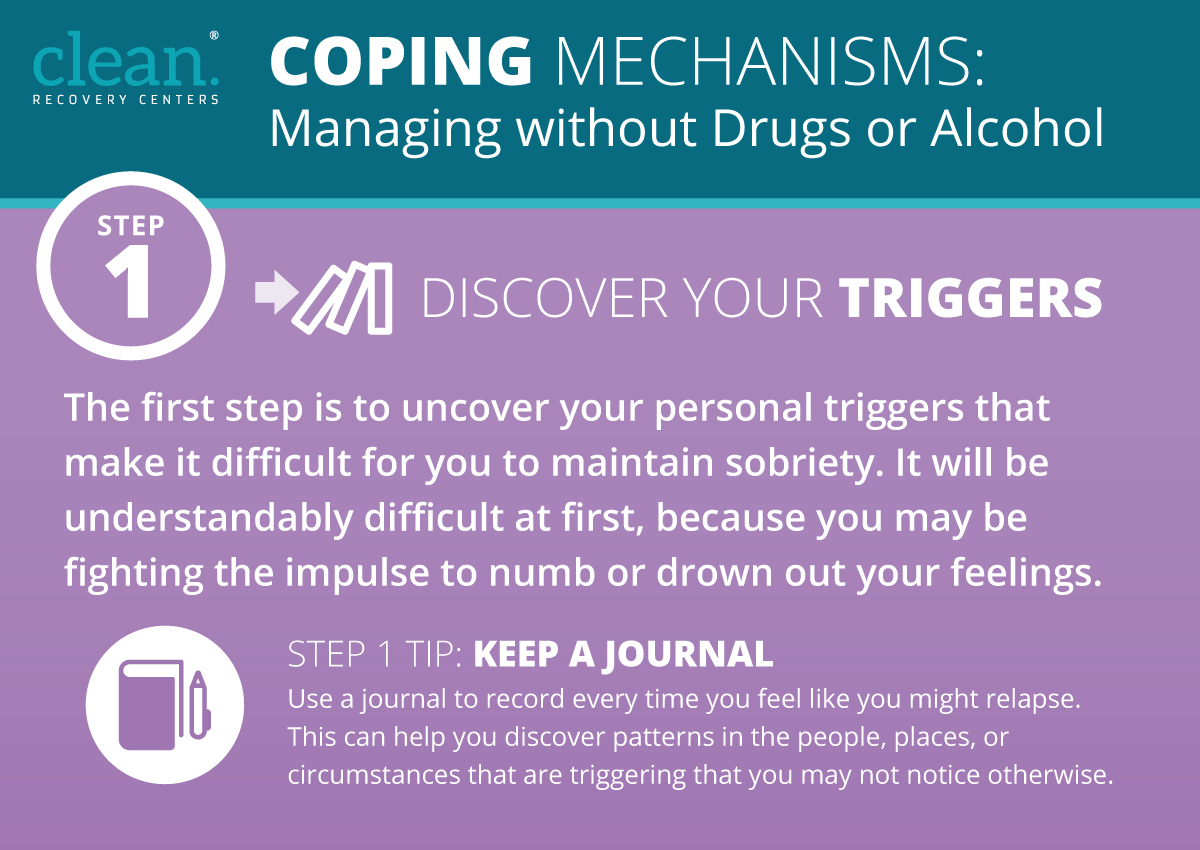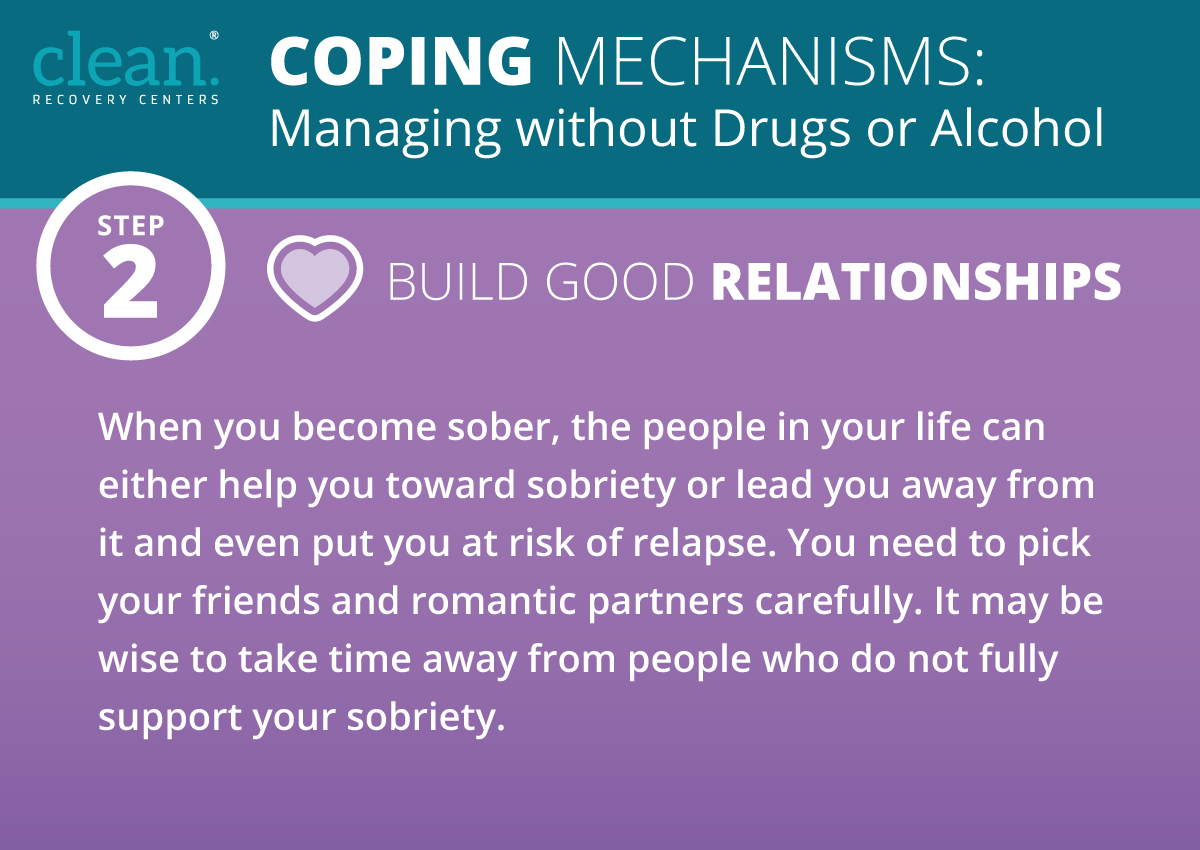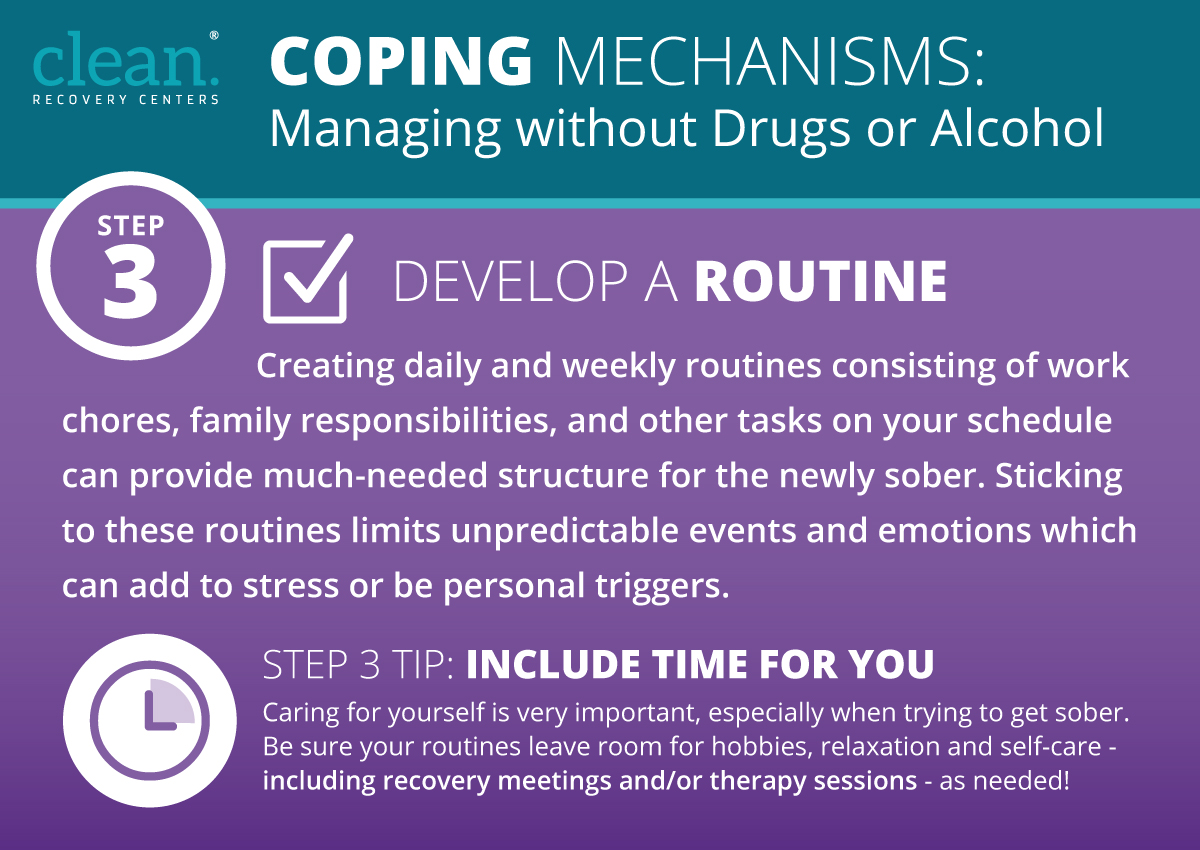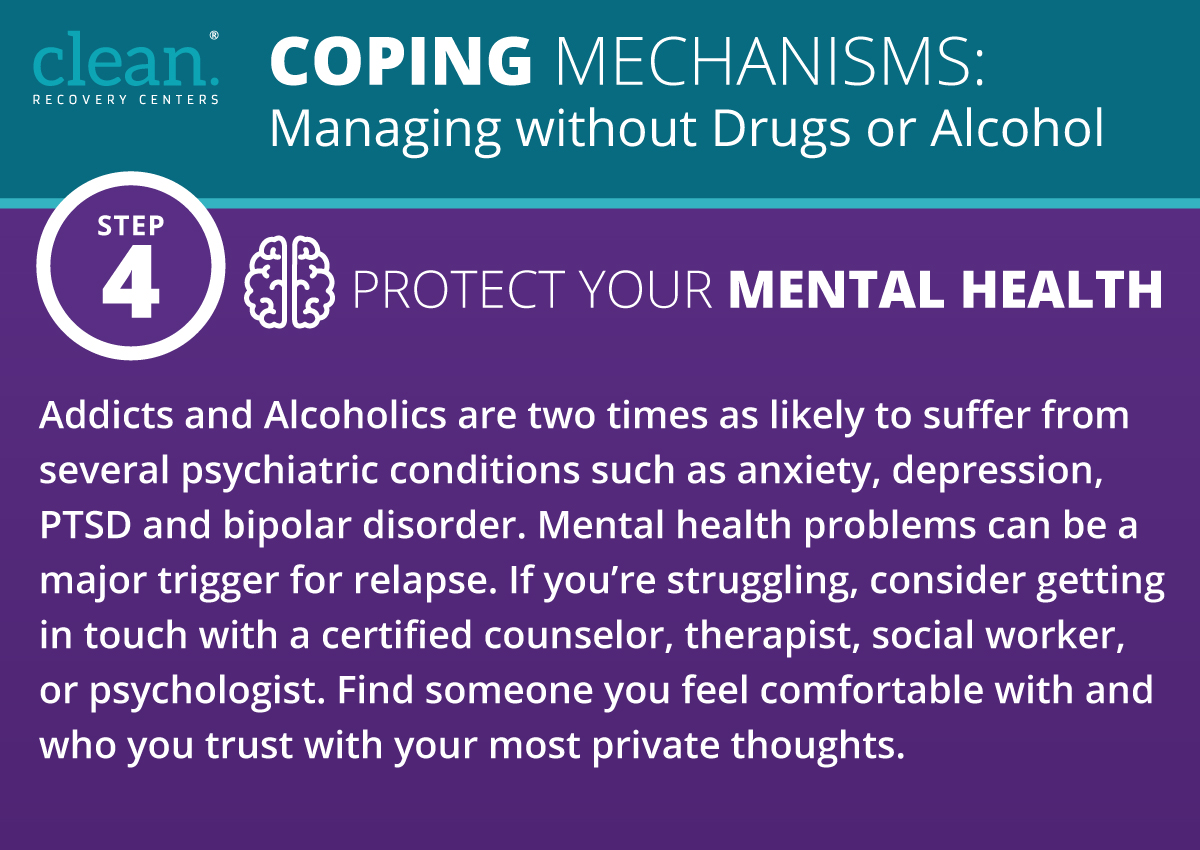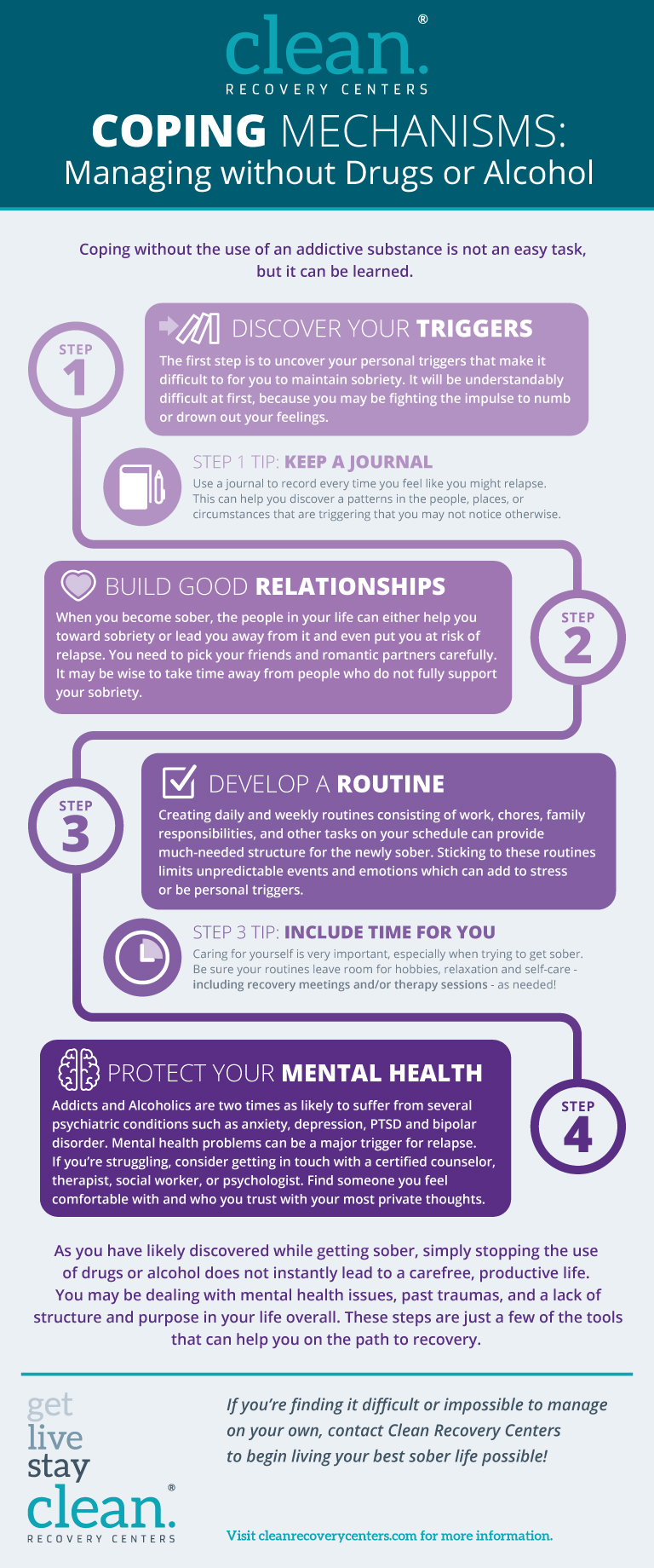Coping Mechanisms: Managing Without Drugs or Alcohol
Are you newly sober? If so, congratulations. You might be dealing with a lot of emotions during this time, such as excitement for a new phase of life, fear at the thought of managing your sobriety long-term, and even shame and guilt when it comes to past actions that you may or may not remember during your struggle with addiction. If you are concerned about maintaining your sobriety, unfortunately, you have good reason to be: according to a 2014 study, up to 60% of those who suffer from alcoholism or drug addiction will relapse within their first year of sobriety. To avoid becoming one of the many who succumb to the familiar feeling of your drug of choice in tough times, consider using this time of your life to cultivate new coping mechanisms that you can rely on in the time of crisis. There are habits you can begin today to start living a fuller, richer life without substance use.

Discover Your Triggers
Coping without the use of an addictive substance is not an easy task, but it can be learned. The first step to using productive coping mechanisms is uncovering your personal triggers that make it difficult for you to maintain sobriety. You might know that certain things lead you to drink or use your drug of choice. Is it seeing a group of people having fun at a bar on a Saturday night? Is it the smell of alcohol? Or is it something less tangible, like the anger you feel after a fight with a spouse?
If you are unaware of your triggers, it would be helpful to keep a journal of every time you feel like you might have a relapse. It will be understandably difficult at first, because you may be fighting the impulse to numb or drown out your feelings. It’s also hard to uncover triggers and work through them on your own, and if you find that this is the case for you, consider contacting a licensed therapist who is qualified to work with someone recovering from an addiction. As you know, there’s much more to addiction than simply wanting to drink or use a drug. For many, behind your addiction are years of trauma, mental health issues, or a lifetime of family or relationship conflict.
Build and Maintain Relationships that are Good for You
It’s not always the case, but if you are a recovering addict or alcoholic, you might be used to hanging out with friends who also use alcohol or drugs in times of happiness, unhappiness, to celebrate, and to de-stress. It’s not unusual to feel the pressure to relapse when you’re around these friends, regardless of what age you are. You are used to living a certain way, socializing with certain people, and participating in certain activities with these people.
When you become sober, you have to learn new ways of coping, decide how to behave in stressful situations, and even choose which friends help you live your life and which hold you back and even put you at risk for relapse. This is no small matter: when you pick your friends and romantic partners carefully, they can either lead you toward sobriety or away from it. It might be wise to take time off from friends you find to be a bad influence or remove them from your social group entirely if they do not support your sobriety. It’s sometimes advised that if you are single in your early sobriety, you don’t date for the first few months or even the first year due to the fact that it’s easy to replace an addictive substance – like alcohol, cocaine, or heroin – with a living, breathing substitute. Have you ever heard of love addiction? This isn’t a clinical diagnosis, but those who have struggled with being too close to their romantic partners will tell you that it’s not easy to break away from using another human being as a coping mechanism! Everybody is different, and relationships might not be your Achilles heel. You will have to make this decision for yourself. Regardless of your relationship or friendship status, you will need to reevaluate your relationships with those around you to make sure they benefit your new life without alcohol or drugs.
Develop a Daily Routine
If your mother told you to make your bed every morning when you were a child, you might have sighed, rolled your eyes, and done it anyway. This simple habit in the early morning – similar to brushing your teeth or sitting down at the table for breakfast – can be life-changing. It’s not about making your bed or doing a specific task in the morning, though a repetitive daily task might help you: Setting a small but attainable goal that you complete in the morning sets the tone for a productive day.
It wires the brain to think “Hey, I’ve already done this one small thing. Maybe I can do one more.” The old adage of “one day at a time” that many recovering alcoholics and addicts rely on is based on a similar principle of taking on small amounts until they add up to a larger amount. You might want to consider, if you are newly sober, creating a weekly or even daily routine that consists of work, chores, family responsibilities, and other tasks that are on your schedule. Also, make room for recovery meetings or therapy as needed. The more structure you can create in your life at this point, the better – especially if unpredictable events or emotions are personal triggers of yours. Over time, you can relax your strict schedule, but in your early sobriety, knowing what to predict and when will help you work through your addiction recovery at a more manageable pace.
Get Help for Mental Illness
Even people who are not dealing with addiction have trouble seeking help for mental health issues. Though the myth of an “addictive personality” doesn’t check out scientifically, there are certain genetic and environmental factors – like growing up in an alcoholic household – that contribute to substance abuse. Addicts and alcoholics are twice as likely to suffer from psychiatric conditions such as anxiety, depression, PTSD, and bipolar disorder in addition to their alcoholism. Mental health problems can be a major trigger for relapse.
If you are struggling to manage your mental health by yourself, consider getting in touch with a certified counselor, therapist, social worker, or psychologist. Find someone who you feel comfortable with, who you feel is not judgmental or triggering of any past shame, and who you trust with your most private thoughts. Rewiring your thought patterns with cognitive-behavioral therapy or using research-proven methods to help overcome the nightmares and paranoia of PTSD can be of great help to you when you are dealing with an addiction at the same time.
As you have likely discovered while getting sober, simply stopping the use of your drug of choice does not lead to a carefree, productive life. You might be dealing with mental health issues, past traumas, and a lack of structure and purpose in your life overall. If you find it difficult or impossible to manage on your own, call us today at 888-330-2532 to begin living your best sober life possible.
Infographic: Coping Mechanisms
View the full Infographic about coping mechanisms for managing without Drugs or Alcohol.


